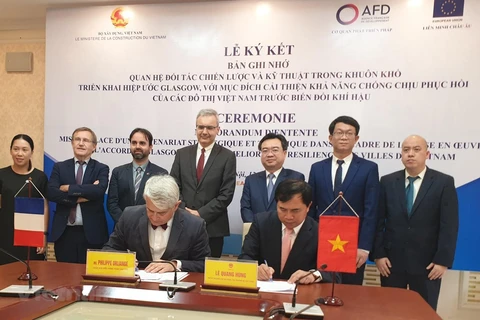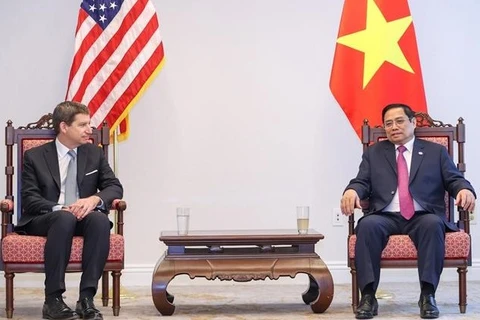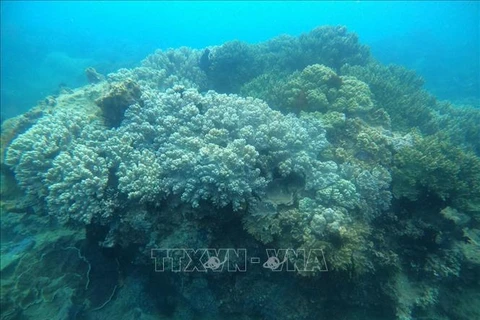 AFD Executive Director Philippe Orliange (left) has recently paid a working visit to Vietnam. (Photo: VNA)
AFD Executive Director Philippe Orliange (left) has recently paid a working visit to Vietnam. (Photo: VNA) Such cooperation priorities completely match commitments made by Vietnamese Prime Minister Pham Minh Chinh at the 26th United Nations Climate Change Conference of the Parties (COP26) in Glasgow, Scotland (the UK), last November, Orliange said in an interview with the press.
The AFD Executive Director, who has recently paid a working visit to Vietnam, also lauded the Vietnamese government’s strong commitments at COP26.
Under the cooperation strategy, the AFD has promoted in-depth discussions with Vietnam’s government agencies on policies regarding climate change impacts, during which analysis and forecasts are shared with the Vietnamese side.
Orliange took cooperation between the agency and the Ministry of Natural Resources and Environment as an example, saying they have worked on a model of forecasting losses caused by climate change to Vietnam’s economy, named GEMMES Vietnam.
Another example is the cooperation with Vietnam Electricity (EVN), which has been maintained for years, under which the AFD has contributed to expanding the power network and raising the efficiency of energy use in Vietnam through projects.
According to the Executive Director, the agency plans to help Vietnam adapt to unavoidable impacts of climate change, and will continue to support Vietnamese urban areas and localities to improve their resilience against climate change.
Since its presence in Vietnam 30 years ago, the AFD has strived to meet the country’s needs in different development periods of the national economy, he said, emphasising that the agency has committed up to 1.3 billion EUR (1.35 billion USD) to both private and public sectors in Vietnam so far.
Apart from loans for the government, the AFD has rolled out projects targeting localities, State-owned enterprises like EVN, commercial banks such as the Bank for Investment and Development of Vietnam (BIDV), and the private sector, he added.
Regarding Vietnam’s energy transition, Orliange said Vietnamese agencies have been clearly aware of the matter as well as its complexity.
The difficulty facing Vietnam in this regard is how to harmonise the increasing demand for electricity to serve economic development, and the need to cut gas emissions from electricity.
The transition requires a lot of time and a detailed plan not only for the case of Vietnam but also other countries in the world, he noted.
Orliange said the AFD’s climate change and energy projects have brought about positive outcomes and benefited local residents, taking a new lock-dam to prevent, especially in the dry season, the rise of saline water, in the northern province of Ninh Binh province as an example.
The agency has recently financed the large-scale Se San 4 solar power project in the Central Highlands province of Kon Tum, and has been implementing projects expanding the Hoa Binh and Ialy hydropower plants, among others./.
VNA






















